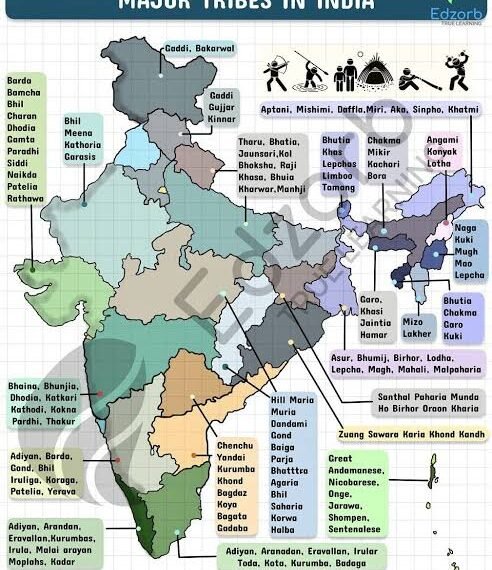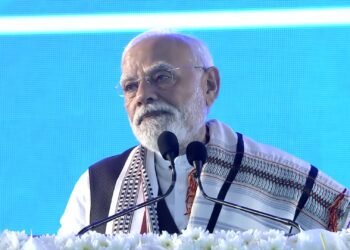This is the first part of a five-part investigative series, “The Mega Tribal Land Grab,” uncovering the growing crisis of illegal tribal land transfers across India. From state acquisitions for mega-projects to deals involving powerful corporates and political actors, the dispossession of Adivasi communities has become a national emergency. We begin with Maharashtra, where over 1,600 cases of land illegally transferred to non-tribals point to a vast, systemic scam enabled by legal loopholes and official complicity. More than just land theft, it is the quiet dismantling of identity, rights, and constitutional protections. Stay tuned as the series unfolds.
By Navin Upadhyay
In the remote tribal hamlets of Maharashtra’s Konkan region, a quiet war is underway—not one fought with weapons, but through forged documents, administrative complicity, and legal sleight of hand. At stake is not just land, but identity, heritage, and the very survival of tribal communities.
For decades, tribal families have helplessly watched as their ancestral land—passed down through generations—was snatched away. Sold without their knowledge, registered in the names of outsiders, or claimed through fraudulent means, this land has quietly slipped out of their grasp. Now, as the scope of this plunder comes to light, a political storm is gathering force.
Last week, the Maharashtra Legislative Assembly was jolted by the revelation that 1,628 cases of suspected illegal transfer of tribal land to non-tribals have taken place in recent years—617 of them between 2021 and 2023 alone. Lawmakers, activists, and tribal leaders believe this number barely scratches the surface, pointing instead to a sprawling, decades-old racket operating across the state’s tribal belts.
Legal Safeguards Breached with Ease
Tribal land in Maharashtra is protected under Section 36A of the Maharashtra Land Revenue Code, 1966, bolstered by a 1974 amendment. The law bars the transfer of tribal agricultural land to non-tribals, except under rare, strictly monitored conditions. But in practice, these safeguards have been routinely bypassed.
Forged tribal certificates, fake sale deeds, and coerced agreements have become tools of quiet dispossession. Revenue officers have frequently failed to verify the tribal status of buyers, allowing illegal transactions to pass through the system unnoticed—or unchecked. Even when courts or collectors ruled such transfers unlawful, land restoration has often been delayed indefinitely.
READ: Harvard vs Trump: Subpoenas, Lawsuits, and Frozen Grants
Districts like Palghar, Thane, Nashik, Gadchiroli, and Nandurbar have become epicenters of these violations. Here, land mafias—often operating with political patronage—target tribal plots for industrial, infrastructure, or real estate projects.
A Racket with Powerful Backers
Addressing the Assembly, Revenue Minister Chandrashekhar Bawankule confirmed 617 improper transfers between 2021 and 2023. Of these, only 404 parcels have been restored to rightful tribal owners. The remaining cases remain mired in red tape, poor documentation, and the influence of powerful encroachers.
The minister’s statement followed allegations by Shiv Sena (UBT) MLA Rajendra Gavit from Palghar, who claimed that of the 1,628 affected land parcels, 732 were in the Konkan division, 619 in Nashik, and 45 in Pune. He further alleged that some of these lands—especially in the Yeoor region of Thane—had been illegally purchased by non-tribal politicians, police officers, and other influential individuals.
“In most cases, the lands were like gold mines, but tribals were given peanuts. Though alternative land was promised, it was never provided. This, despite clear laws and court rulings prohibiting such transfers,” Gavit said.
In response, Bawankule reiterated that there is an absolute bar on transferring agricultural land owned by tribals. Even for residential or commercial land, he said, 34 stringent conditions must be met before such a sale is permitted.
He also reminded the House that under existing provisions, tribals can file complaints regarding land transfers dating back to 1974—so long as they occurred before 2004. This legal window for retrospective claims remains open until 2034.
But critics say this focus on historic claims is now being used as a diversion.
Exploiting the Voiceless
What’s changed, activists say, is not the law—but the method. Earlier, it was brute coercion. Today, it’s a slow and calculated fraud carried out on paper.
Poor and often illiterate, tribal families are routinely deceived—offered meager compensation, or unaware that any transaction has taken place at all. By the time they realise what’s happening—when barbed wire goes up or bulldozers arrive—it’s too late.
READ: In Brotherhood, Mizoram Opens Heart and Borders to Myanmar Refugees
In many cases, families have no formal land titles, despite living on the land for generations. This makes them vulnerable to manipulations involving forged gumasta forms, fake collector approvals, and pressure from local sarpanches or contractors with political links.
A System Empowered—Yet Paralyzed
The irony is that the state has the power to act. Divisional Commissioners, Tehsildars, and Collectors are fully authorised to cancel illegal transfers, restore land, and initiate criminal proceedings. But implementation has been, at best, inconsistent—and at worst, complicit.
A 2017 government circular had directed all districts to verify tribal land transactions. Few complied. In many cases, action has come only after years of legal battles, RTI filings, or public outcry—by which time the land is often further sold, developed, or irreversibly altered.
The government has now pledged to share details of all 1,628 disputed cases with MLAs and initiate fresh inquiries. Minister Bawankule has promised a comprehensive report in the next Assembly session and assured that both recent and historic cases will be investigated.
But activists remain wary.
“Without accountability and punishment of the guilty—within both government and outside—it’ll be another bureaucratic ritual,” warned a senior land rights advocate in Nashik.
The question arises: Can the same system that enabled this theft of land be trusted to fix it?
For Maharashtra’s tribal communities, this is not just a legal issue—it is about dignity, inheritance, and survival. The erosion of land rights threatens to wipe out not only their homes, but their history and culture.
The laws exist. The powers exist. What’s missing is political will and a sustained commitment to justice.
Unless there is swift legal action, transparent investigation, and meaningful rehabilitation, tribal land will remain what it has quietly become: a resource shared in principle, but stolen in reality.













